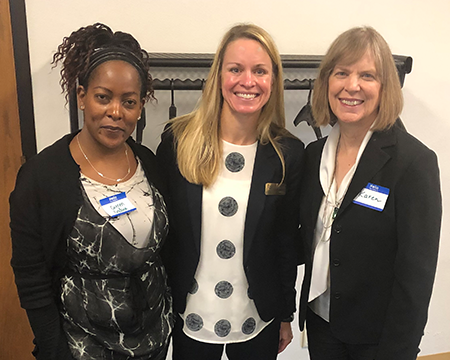Informatics researchers look at community strengths to address opioid epidemic
November 7, 2019

Informatics researchers look at community strengths to address opioid epidemic
DNP student Carren Ondara, Assistant Professor Robin Austin and Professor Karen Monsen
Community members from the Hue-MAN Partnership and researchers from the University of Minnesota School of Nursing are collaborating on research to help racial and ethnic minority communities better understand how to leverage community strengths to address the opioid epidemic. The research aims to address the health disparities caused by social stigma and structural bias and shift the conversation from stigma to strengths.
School of Nursing Professor Karen Monsen, PhD, RN, FAMIA, FAAN, and Assistant Professor Robin Austin, PhD, DNP, DC, RN-BC, together with Doctor of Nursing Practice students and R. Clarence Jones, MEd, CPH, CHW, CPE, and additional Hue-MAN colleagues, engaged with community members across the state at lunch-and-learns, conferences, health fairs and other community meetings. Over 350 participants at 13 meetings shared information and ideas about ways to address the opioid crisis from the community’s perspective.
“We are so honored to work with Hue-MAN to connect directly with communities,” said Monsen. Hue-MAN Partnership includes health care, community and professional organizations and seeks to reduce health disparities among men in the community.
Community members completed surveys to understand opioid-related information from the community perspective. The majority of community members said they, a family member or friend were affected by opioids misuse.
“These meetings have been a great opportunity to learn from community members how to share valuable community data to support their planning and engagement in policy around opioids,”
- Professor Karen Monsen
The research team was invited to present the data to the Minnesota Department of Health Epidemiology State Work Group. “It’s community-level data and the voice of the community saying this is what we need, so they were very receptive,” said Austin.
The next phase in the research aims to use the MyStrengths+MyHealth application for community members to self-report strengths, challenges and needs so that communities will have their own comprehensive, holistic data from which to launch opioids initiatives. The aim is to survey 1,000 people throughout the state with the app. The app, created by Austin and Monsen, will provide rich data to understand community strengths around the opioid issue.
“The app is based on the Omaha System that looks at whole person health, including health-related behaviors and social determinants of health data. It’s a broader perspective. From that data, we’re trying to determine where their strengths are,” said Austin.
The Center for Nursing Informatics at the School of Nursing is home to the research arm of the Omaha System, which defines the whole person in 42 health concepts. This project was funded by the University of Minnesota Clinical and Translational Science Institute Office of Community Engagement to Advance Research and Community Health (CEARCH); NIH Clinical and Translational Science Award at the University of Minnesota: UL1 TR002494.